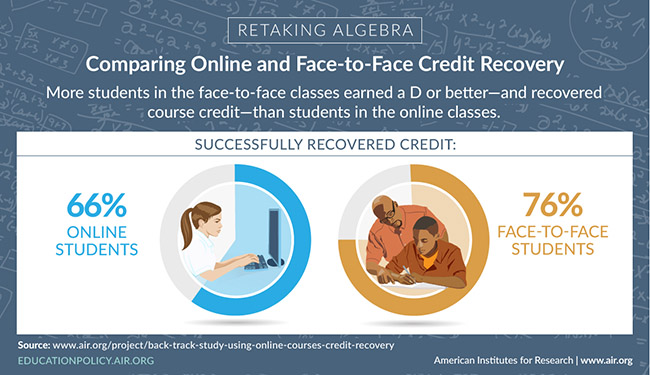The Back on Track Study: Using Online Courses for Credit Recovery
Students who fail Algebra I in their first year of high school are significantly less likely to graduate than students who succeed in the course. To get back on track after failing a course, students need opportunities to recover credit. Historically, students have retaken courses in traditional face-to-face settings either in summer school or during the school year.
More recently, online learning has emerged as a popular strategy for providing students with the opportunity to recover course credit even though little is known about whether these experiences lead to better academic outcomes. The Back on Track Study is a rigorous research study designed to provide much-needed evidence for practitioners and policymakers to inform decisions about how to help students get back on track toward high school graduation.
AIR and the University of Chicago Consortium on School Research are conducting a study to examine the use of online courses to provide students who fail Algebra I in the ninth grade with the opportunity to recover credit for the course. The study is a randomized controlled trial that followed ninth grade students from the summer after failing Algebra I through potential graduation four years later. The study is funded by the U. S. Department of Education’s Institute of Education Sciences.

View full-page infographic (PDF)
The project produced a series of research briefs that discuss the findings regarding the relative impact of online versus face-to-face Algebra I credit recovery on students’ academic outcomes and the effects over time of expanding credit recovery options for at-risk students, as well as aspects of how the two types of credit recovery courses were implemented.
Research Briefs
Comparing the Effects of Online and Face-to-Face Credit Recovery in Algebra I
This first brief in the series compares educational outcomes through the second year of high school for students who took an online credit recovery course and those who took a face-to-face credit recovery course.
The Role of In-Person Instructional Support for Students Taking Online Credit Recovery
The second brief describes the role of in-class mentors in the online classrooms and examines whether students benefited from additional instructional support from their in-class mentors.
Getting Back on Track: Who Needs to Recover Algebra Credit After Ninth Grade?
The study's third brief describes the characteristics of students who failed Algebra I in ninth grade in the large urban school district where the study took place, to better understand the population of students who are served by credit recovery courses.
Getting Back on Track: What Math Content Is Taught and Learned in Online and Face-to-Face Algebra Credit Recovery Courses?
The fourth brief evaluates the content provided in online and face-to-face algebra credit recovery courses and reveals possible differences based on instructor preferences and district guidelines.
The Effect of Online Versus Face-to-Face Credit Recovery in Algebra on High School Credit Accumulation and Graduation
The series' fifth brief extends the analysis presented in the first brief to compare educational outcomes through the fourth year of high school for students who took an online credit recovery course and those who took a face-to-face credit recovery course.
Getting Back on Track: Course Progression for Students Who Fail Algebra I in Ninth Grade
The sixth and final brief in the series describes the course progression of students who failed Algebra I in ninth grade in the large urban school district where the study took place, to help determine the importance of Algebra I failure and recovery for student success in subsequent courses and, ultimately, high school graduation.
